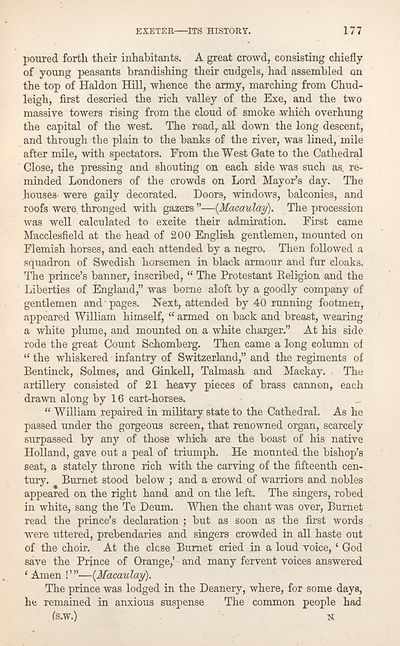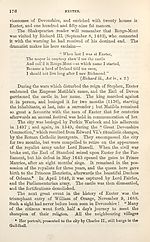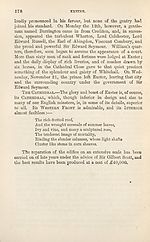Download files
Complete book:
Individual page:
Thumbnail gallery: Grid view | List view

EXETER ITS HISTORY.
177
poured forth their inhabitants. A great crowd, consisting chiefly
of young peasants brandishing their cudgels, had assembled on
the top of Haldon Hill, whence the army, marching from Chud-
leigh, first descried the rich valley of the Exe, and the two
massive towers rising from the cloud of smoke which overhung
the capital of the west. The road,, all down the long descent,
and through the plain to the banks of the river, was lined, mile
after mile, with spectators. Prom the West Gate to the Cathedral
Close, the pressing and shouting on each side was such as. re¬
minded Londoners of the crowds on Lord Mayor’s day. The
houses- were gaily decorated. Doors, windows, balconies, and
roofs were thronged with gazers ”—(Macaulay). The procession
was well calculated to exeite their admiration. First came
Macclesfield at the head of 200 English gentlemen, mounted on
Flemish horses, and each attended by a negro. Then followed a
squadron of Swedish horsemen in black armour and fur cloaks.
The prince’s banner, inscribed, “ The Protestant Religion and the
Liberties of England,” was borne aloft by a goodly company of
gentlemen and'pages. Next,, attended by 40 running footmen,
appeared William himself, “ armed on back and breast, wearing
a white plume, and mounted on a white charger.” At his side
rode the great Count Schomberg. Then came a long column of
“ the whiskered infantry of Switzerland,” and the regiments of
Bentinck, Solmes, and Ginkell, Talmash and Mackay. The
artillery consisted of 21 heavy pieces of brass cannon, each
drawn along by 16 cart-horses.
“ William repaired in military state to the Cathedral. As he
passed under the gorgeous screen, that renowned organ, scarcely
surpassed by any of those which are the boast of his native
Holland, gave out a peal of triumph. He mounted the bishop’s
seat, a stately throne rich with the- carving of the fifteenth cen-.
tury. Burnet stood below ; and a crowd of warriors and nobles
appeared on the right hand and on the left. The singers, robed
in white, sang the Te Deum. When the chant was over, Burnet
read the prince’s declaration ; but as soon as the first words
were uttered, prebendaries and singers crowded in all haste out
of the choir. At the close Bumet cried in a loud voice, ‘ God
save the Prince of Orange,’ and many fervent voices answered
‘ Amen !’”—(Macaulay).
The prince was lodged in the Deanery, where, for some days,
he remained in anxious suspense The common people had
few.) N
177
poured forth their inhabitants. A great crowd, consisting chiefly
of young peasants brandishing their cudgels, had assembled on
the top of Haldon Hill, whence the army, marching from Chud-
leigh, first descried the rich valley of the Exe, and the two
massive towers rising from the cloud of smoke which overhung
the capital of the west. The road,, all down the long descent,
and through the plain to the banks of the river, was lined, mile
after mile, with spectators. Prom the West Gate to the Cathedral
Close, the pressing and shouting on each side was such as. re¬
minded Londoners of the crowds on Lord Mayor’s day. The
houses- were gaily decorated. Doors, windows, balconies, and
roofs were thronged with gazers ”—(Macaulay). The procession
was well calculated to exeite their admiration. First came
Macclesfield at the head of 200 English gentlemen, mounted on
Flemish horses, and each attended by a negro. Then followed a
squadron of Swedish horsemen in black armour and fur cloaks.
The prince’s banner, inscribed, “ The Protestant Religion and the
Liberties of England,” was borne aloft by a goodly company of
gentlemen and'pages. Next,, attended by 40 running footmen,
appeared William himself, “ armed on back and breast, wearing
a white plume, and mounted on a white charger.” At his side
rode the great Count Schomberg. Then came a long column of
“ the whiskered infantry of Switzerland,” and the regiments of
Bentinck, Solmes, and Ginkell, Talmash and Mackay. The
artillery consisted of 21 heavy pieces of brass cannon, each
drawn along by 16 cart-horses.
“ William repaired in military state to the Cathedral. As he
passed under the gorgeous screen, that renowned organ, scarcely
surpassed by any of those which are the boast of his native
Holland, gave out a peal of triumph. He mounted the bishop’s
seat, a stately throne rich with the- carving of the fifteenth cen-.
tury. Burnet stood below ; and a crowd of warriors and nobles
appeared on the right hand and on the left. The singers, robed
in white, sang the Te Deum. When the chant was over, Burnet
read the prince’s declaration ; but as soon as the first words
were uttered, prebendaries and singers crowded in all haste out
of the choir. At the close Bumet cried in a loud voice, ‘ God
save the Prince of Orange,’ and many fervent voices answered
‘ Amen !’”—(Macaulay).
The prince was lodged in the Deanery, where, for some days,
he remained in anxious suspense The common people had
few.) N
Set display mode to:
![]() Universal Viewer |
Universal Viewer | ![]() Mirador |
Large image | Transcription
Mirador |
Large image | Transcription
| Antiquarian books of Scotland > Adventure and adventurers > Black's guide to the counties of Dorset, Devon, & Cornwall > (214) |
|---|
| Permanent URL | https://digital.nls.uk/142588947 |
|---|
| Description | Thousands of printed books from the Antiquarian Books of Scotland collection which dates from 1641 to the 1980s. The collection consists of 14,800 books which were published in Scotland or have a Scottish connection, e.g. through the author, printer or owner. Subjects covered include sport, education, diseases, adventure, occupations, Jacobites, politics and religion. Among the 29 languages represented are English, Gaelic, Italian, French, Russian and Swedish. |
|---|

